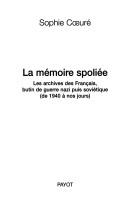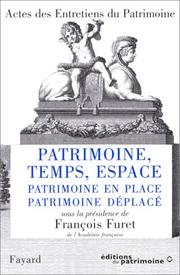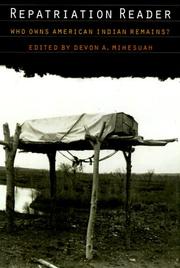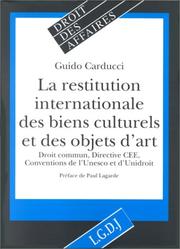| Listing 1 - 7 of 7 |
Sort by
|
Book
ISBN: 1283152495 9786613152497 1400839246 9781400839247 9781283152495 9780691148106 0691148104 Year: 2011 Publisher: Princeton, N.J. Woodstock Princeton University Press
Abstract | Keywords | Export | Availability | Bookmark
 Loading...
Loading...Choose an application
- Reference Manager
- EndNote
- RefWorks (Direct export to RefWorks)
Whether antiquities should be returned to the countries where they were found is one of the most urgent and controversial issues in the art world today, and it has pitted museums, private collectors, and dealers against source countries, archaeologists, and academics. Maintaining that the acquisition of undocumented antiquities by museums encourages the looting of archaeological sites, countries such as Italy, Greece, Egypt, Turkey, and China have claimed ancient artifacts as state property, called for their return from museums around the world, and passed laws against their future export. But in Who Owns Antiquity?, one of the world's leading museum directors vigorously challenges this nationalistic position, arguing that it is damaging and often disingenuous. "Antiquities," James Cuno argues, "are the cultural property of all humankind," "evidence of the world's ancient past and not that of a particular modern nation. They comprise antiquity, and antiquity knows no borders." Cuno argues that nationalistic retention and reclamation policies impede common access to this common heritage and encourage a dubious and dangerous politicization of antiquities--and of culture itself. Antiquities need to be protected from looting but also from nationalistic identity politics. To do this, Cuno calls for measures to broaden rather than restrict international access to antiquities. He advocates restoration of the system under which source countries would share newly discovered artifacts in exchange for archaeological help, and he argues that museums should again be allowed reasonable ways to acquire undocumented antiquities. Cuno explains how partage broadened access to our ancient heritage and helped create national museums in Cairo, Baghdad, and Kabul. The first extended defense of the side of museums in the struggle over antiquities, Who Owns Antiquity? is sure to be as important as it is controversial.Some images inside the book are unavailable due to digital copyright restrictions.
Antiquities -- Collection and preservation -- Philosophy. --- Cultural property -- Repatriation. --- Cultural property. --- Museums -- Acquisitions -- Philosophy. --- Museums -- Collection management -- International cooperation. --- History & Archaeology --- Archaeology --- Antiquities --- Cultural property --- Museums --- Collection and preservation --- Philosophy. --- Repatriation. --- Acquisitions --- Collection management --- International cooperation.

Abstract | Keywords | Export | Availability | Bookmark
 Loading...
Loading...Choose an application
- Reference Manager
- EndNote
- RefWorks (Direct export to RefWorks)
World War, 1939-1945 --- Cultural property --- Archives --- Destruction and pillage --- Confiscations and contributions --- Repatriation --- History --- 2nd World War - French Public and Private Archives - Nazi and Soviet Pillages - 20th Century --- World War, 1939-1945 - Destruction and pillage - France --- World War, 1939-1945 - Confiscations and contributions - France --- Cultural property - Repatriation - France --- Archives - France - History

ISBN: 2213598517 9782213598512 Year: 1997 Volume: 2 Publisher: Paris, : Fayard : Éd. du patrimoine,
Abstract | Keywords | Export | Availability | Bookmark
 Loading...
Loading...Choose an application
- Reference Manager
- EndNote
- RefWorks (Direct export to RefWorks)
Cultural property --- Art --- Protection --- Congresses. --- Conservation and restoration --- Repatriation --- Muséologie --- Patrimoine culturel --- Musées --- Actes de congrès --- Conservation et restauration --- Actes de congrès. --- Musées d'art. --- Muséologie. --- Protection. --- Conservation et restauration. --- Cultural property - Protection - Congresses. --- Art - Conservation and restoration - Congresses. --- Cultural property - Repatriation - Congresses. --- Cultural property - Protection - France - Congresses. --- Art - Conservation and restoration - France - Congresses. --- Musées d'art. --- Muséologie.
Book
ISBN: 9781848225367 1848225369 Year: 2021 Publisher: London : Lund Humphries, in association with Sotheby's Institute of Art,
Abstract | Keywords | Export | Availability | Bookmark
 Loading...
Loading...Choose an application
- Reference Manager
- EndNote
- RefWorks (Direct export to RefWorks)
Debates about the restitution of cultural objects have been ongoing for many decades, but have acquired a new urgency recently with the intensification of scrutiny of European museum collections acquired in the colonial period. Alexander Herman's fascinating and accessible book provides a comprehensive and up-to-date overview of the restitution debate with reference to a wide range of current controversies. This is a book about the return of cultural treasures: why it is demanded, how it is negotiated and where it might lead. The uneven relationships of the past have meant that some of the greatest treasures of the world currently reside in places far removed from where they were initially created and used. Today we are witnessing the ardent attempts to put right those past wrongs: a light has begun to shine on the items looted from Asia, Africa, the Middle East, the Americas and the Pacific, and the scales of history, according to some, are in need of significant realignment. This debate forces us to confront an often dark history, and the difficult application of our contemporary conceptions of justice to instances from the past. Should we allow plundered artefacts to rest where they lie - often residing there by the imbalances of history? This book asks whether we are entering a new 'restitution paradigm', one that could have an indelible impact on the cultural sector - and the rest of the world - for many years to come. It provides essential reading for all those working in the art and museum worlds and beyond.
Art --- provenance [history of ownership] --- cultural artifacts --- cultural heritage --- restitution --- Cultural property --- Patrimoine culturelle --- Antiquities --- Antiquités --- Repatriation. --- Rapatriement --- Collection and preservation --- Moral and ethical aspects. --- Collectionneurs et collections --- Aspect moral. --- repatriëring van kunst --- Antiquities ; Collection and preservation ; Moral and ethical aspects. --- Cultural property ; Repatriation. --- Patrimoine culturel --- Erstattung. --- Kunstraub. --- Restitution. --- Collections et conservation

ISBN: 0803282648 9780803282643 9786610423804 1280423803 0803206313 9780803206311 9781280423802 Year: 2000 Publisher: Lincoln : University of Nebraska Press,
Abstract | Keywords | Export | Availability | Bookmark
 Loading...
Loading...Choose an application
- Reference Manager
- EndNote
- RefWorks (Direct export to RefWorks)
culturele antropologie --- Ethnology. Cultural anthropology --- Amerindian [culture] --- social anthropology --- Indianen --- Archeology --- United States --- Anthropological ethics -- United States. --- Cultural property -- Government policy -- United States. --- Cultural property -- Repatriation -- United States -- Philosophy. --- Human remains (Archaeology) -- Law and legislation -- United States. --- Human remains (Archaeology) -- Repatriation -- United States. --- Indians of North America -- Antiquities -- Law and legislation. --- Indians of North America -- Material culture. --- United States. -- Native American Graves Protection and Repatriation Act. --- Indians of North America --- Human remains (Archaeology) --- Cultural property --- Anthropological ethics --- Ethnic & Race Studies --- Gender & Ethnic Studies --- Social Sciences --- Material culture --- Antiquities --- Law and legislation --- Repatriation --- Philosophy --- Government policy --- Material culture. --- Law and legislation. --- Philosophy. --- United States. --- Anthropologists --- Anthropology --- Cultural heritage --- Cultural patrimony --- Cultural resources --- Heritage property --- National heritage --- National patrimony --- National treasure --- Patrimony, Cultural --- Treasure, National --- Skeletal remains (Archaeology) --- Professional ethics --- Moral and ethical aspects --- Property --- World Heritage areas --- Human skeleton --- Primate remains (Archaeology) --- material culture [discipline] --- cultural property --- human remains --- North America --- Bioarchaeology

ISBN: 227501571X 9782275015712 Year: 1997 Publisher: Paris : LGDJ,
Abstract | Keywords | Export | Availability | Bookmark
 Loading...
Loading...Choose an application
- Reference Manager
- EndNote
- RefWorks (Direct export to RefWorks)
Cultural property --- Restitution --- Receiving stolen goods --- Protection --- Law and legislation --- Protection (International law) --- Repatriation --- Patrimoine culturel --- Droit international --- Droit européen --- Droit --- -Cultural property --- -Receiving stolen goods --- Replevin --- Unjust enrichment --- Dealing in stolen goods --- Fences (Receivers of stolen goods) --- Fencing (Receiving stolen goods) --- Receiver of stolen goods --- Stolen goods, Receiving --- Crime --- Cultural heritage --- Cultural patrimony --- Cultural resources --- Heritage property --- National heritage --- National patrimony --- National treasure --- Patrimony, Cultural --- Treasure, National --- Property --- World Heritage areas --- -Law and legislation --- Receiving stolen goods. --- Restitution. --- Law and legislation. --- Repatriation. --- Protection (International law). --- Repatriation of cultural property --- Cultural policy --- International law --- Protection&delete& --- Government policy --- Droit international. --- Droit européen. --- Cultural property - Protection - Law and legislation --- Cultural property - Protection (International law) --- Cultural property - Repatriation
Book
ISBN: 128354816X 9786613860613 1400833043 0691154430 0691133336 9780691133331 9781400833047 9780691154435 9780691154435 Year: 2012 Publisher: Princeton Princeton University Press
Abstract | Keywords | Export | Availability | Bookmark
 Loading...
Loading...Choose an application
- Reference Manager
- EndNote
- RefWorks (Direct export to RefWorks)
The international controversy over who "owns" antiquities has pitted museums against archaeologists and source countries where ancient artifacts are found. In his book Who Owns Antiquity?, James Cuno argued that antiquities are the cultural property of humankind, not of the countries that lay exclusive claim to them. Now in Whose Culture?, Cuno assembles preeminent museum directors, curators, and scholars to explain for themselves what's at stake in this struggle--and why the museums' critics couldn't be more wrong. Source countries and archaeologists favor tough cultural property laws restricting the export of antiquities, have fought for the return of artifacts from museums worldwide, and claim the acquisition of undocumented antiquities encourages looting of archaeological sites. In Whose Culture?, leading figures from universities and museums in the United States and Britain argue that modern nation-states have at best a dubious connection with the ancient cultures they claim to represent, and that archaeology has been misused by nationalistic identity politics. They explain why exhibition is essential to responsible acquisitions, why our shared art heritage trumps nationalist agendas, why restrictive cultural property laws put antiquities at risk from unstable governments--and more. Defending the principles of art as the legacy of all humankind and museums as instruments of inquiry and tolerance, Whose Culture? brings reasoned argument to an issue that for too long has been distorted by politics and emotionalism. In addition to the editor, the contributors are Kwame Anthony Appiah, Sir John Boardman, Michael F. Brown, Derek Gillman, Neil MacGregor, John Henry Merryman, Philippe de Montebello, David I. Owen, and James C. Y. Watt.
Antiquities -- Collection and preservation -- Moral and ethical aspects. --- Antiquities -- Collection and preservation -- Social aspects. --- Cultural property -- Protection. --- Cultural property -- Repatriation. --- Excavations (Archaeology) -- Moral and ethical aspects. --- Museum exhibits -- Moral and ethical aspects. --- Museums -- Acquisitions -- Moral and ethical aspects. --- Museums -- Philosophy. --- Museums --- Museum exhibits --- Cultural property --- Antiquities --- Excavations (Archaeology) --- General --- Museum Publications --- Moral and ethical aspects --- Acquisitions --- Protection --- Repatriation --- Collection and preservation --- Social aspects --- Philosophy --- Moral and ethical aspects. --- Social aspects. --- Protection. --- Repatriation. --- Philosophy. --- Display techniques --- Displays, Museum --- Museum displays --- Archaeological digs --- Archaeological excavations --- Digs (Archaeology) --- Excavation sites (Archaeology) --- Ruins --- Sites, Excavation (Archaeology) --- Repatriation of cultural property --- Cultural property, Protection of --- Cultural resources management --- Archaeological specimens --- Artefacts (Antiquities) --- Artifacts (Antiquities) --- Specimens, Archaeological --- Exhibitions --- Government policy --- Law and legislation --- Restitution --- Public institutions --- Cabinets of curiosities --- Museum techniques --- Archaeology --- Cultural policy --- Historic preservation --- Material culture --- 037 --- 069.01 --- 7.025.7 --- 7.025.7 Kunstwerken: verlies, teloorgang door o.a. diefstal of tijdens transport --- Kunstwerken: verlies, teloorgang door o.a. diefstal of tijdens transport --- 069.01 Museologie --- Museologie --- Collection and preservation&delete& --- Acquisitions&delete& --- musea --- Musées --- Objets exposés --- Biens culturels --- Antiquités --- Fouilles (Archéologie) --- Aspect moral --- Collections et conservation --- Aspect social --- Philosophie --- Accessibility. --- American Journal of Archaeology. --- American Schools of Oriental Research. --- Ancient Egypt. --- Ancient Greece. --- Ancient Greek art. --- Antiquities. --- Archaeological context. --- Archaeological site. --- Archaeology. --- Art Loss Register. --- Art museum. --- Arts and Crafts movement. --- Beijing. --- Benin. --- Burial. --- Cambridge University Press. --- Capital Museum. --- Censorship. --- Circumstantial evidence. --- Civilization. --- Collecting. --- Colonialism. --- Consideration. --- Cosmopolitanism. --- Country of origin. --- Crime. --- Criticism. --- Cultural Property (Japan). --- Cultural appropriation. --- Cultural heritage. --- Cultural nationalism. --- Cultural property law. --- Cultural property. --- Curator. --- Elgin Marbles. --- Epigraphy. --- Euphronios Krater. --- Fu Hao. --- Funding. --- Iconoclasm. --- Ideology. --- Indigenous peoples. --- Insider. --- Institution. --- Intellectual property. --- International Council of Museums. --- J. Paul Getty Museum. --- Jews. --- Kenya. --- Kwame Anthony Appiah. --- Lansdowne portrait. --- Lecture. --- Legislation. --- Literature. --- Looting. --- Material culture. --- Matthew Bogdanos. --- Member state. --- Metropolitan Museum of Art. --- Museum. --- National Museum of the American Indian. --- National Palace Museum. --- National Treasure (Japan). --- National treasure. --- Native American Graves Protection and Repatriation Act. --- Neolithic. --- Newspaper. --- Ownership. --- Partage. --- Personhood. --- Philistinism. --- Private collection. --- Provenance. --- Publication. --- Punitive expedition. --- Repatriation (humans). --- Rhetoric. --- Roman art. --- Ruler. --- Smithsonian Institution. --- Smuggling. --- Sophistication. --- State ownership. --- Statute. --- Superiority (short story). --- Taliban. --- Tax. --- The Hundreds. --- The New York Review of Books. --- The New York Times. --- Theft. --- Tomb of Fu Hao. --- Tomb. --- Treaty. --- Tribal art. --- UNESCO. --- Urkesh. --- Work of art. --- World Heritage Site.
| Listing 1 - 7 of 7 |
Sort by
|

 Search
Search Feedback
Feedback About
About Help
Help News
News